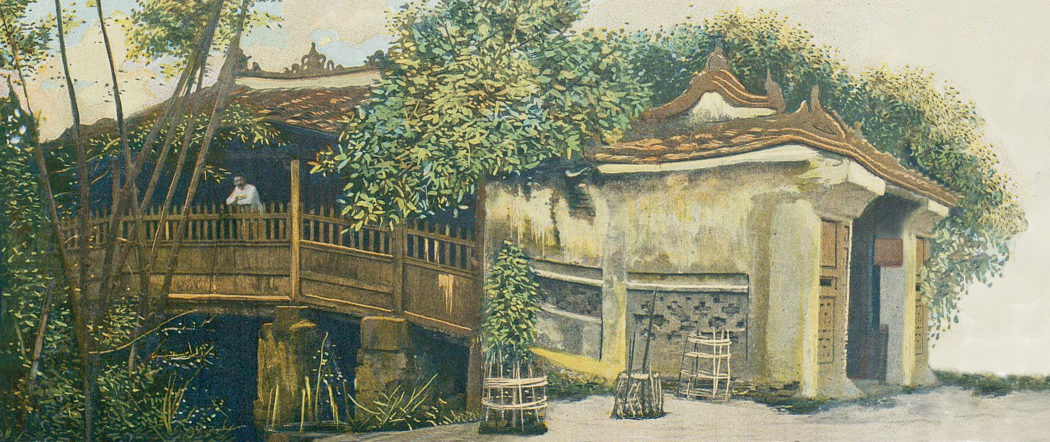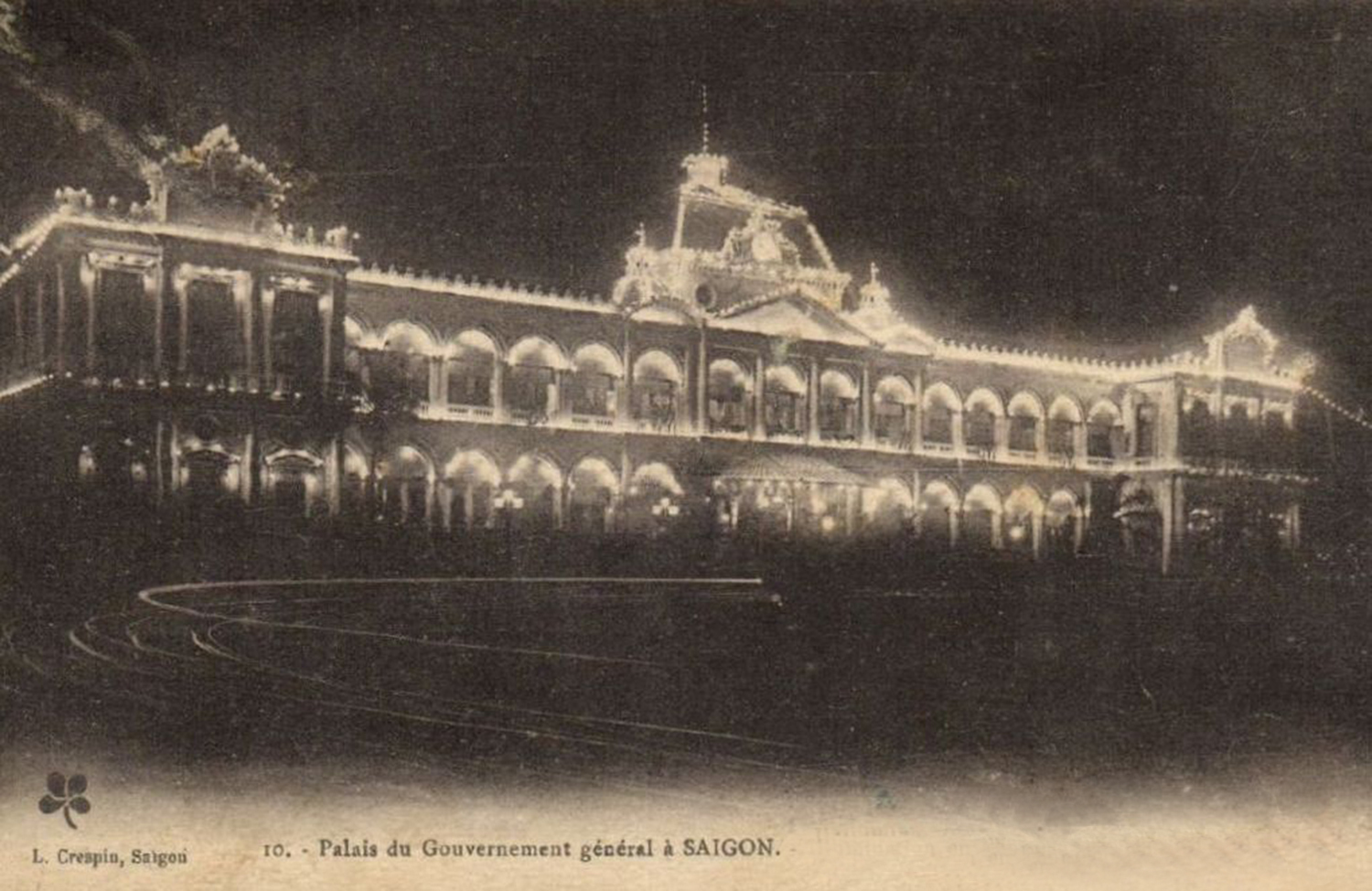
The Palace of the Government General in Saigon, illuminated for a ball
The King of Cambodia, H M Norodom I, and the Emperor of Annam, H M Thanh-Thai, have just paid a visit to the Governor-General in Saigon.
The stay of the old Khmer sovereign and the young Annamite emperor in the old capital of French Indo-China took place on the occasion of splendid week-long celebrations.
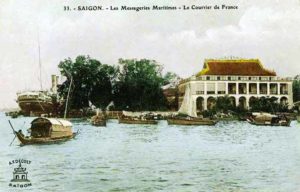
Saigon harbour at the turn of the 20th century
Celebrations in a French colony! Those people whose minds are anchored to the prejudice that our colonies are “lost, miserable, unhealthy” countries filled with unhappy people shivering with fever in “straw jungle huts” might believe that these celebrations are just vulgar rejoicings and sad feasts in which preserves provide the dishes of resistance. However, few large European cities could offer a festival a setting as beautiful as Saigon, that former Annamite city which the French colonising genius has so rapidly transformed into the capital many English people call their “loss in the Far East.”
These were my words when I reported on the festivities organised to celebrate the 25th anniversary of the conquest in 1884. I have not changed my mind after reading the details of the reception given to the two sovereigns sent to me by our correspondents from Saigon and our confrères from the newspaper Le Mékong. I only wish I could publish everything. But that would demand a review article, rather than a newspaper report. So it will have to be just a few lines.
On the first day, at the Palace of the Government General, there was a reception and a ball.
King Norodom was introduced first. The Cambodian king appeared a little old, a little “compacted.”
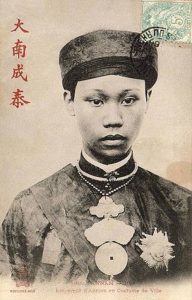
Emperor Thành Thái (1889-1907)
Then, accompanied by M. Doumer, came the young Emperor Thanh-Thai, who is not yet 20 years old. He was dressed in a multi-coloured costume constellated with gold and precious stones, the grand cordon de la Légion d’honneur around his neck. He wore a turban of yellow silk, an imperial colour which only he has the right to wear. His wife and younger brothers were at his side.
An amusing observation: though individually very straightforward, very natural with everybody, the two sovereigns, as soon as they were close to each other, adopted the attitudes of idols.
The fireworks amused both Majesties greatly. Less, however, than the gala the next evening at the Municipal Theatre. Would you like to know the programme?
“The Marseillaise, sung by Madame Dargissonne and choir, with apotheosis and grand staging by Mr. Maurel, director general. Then the second act of Lakmé. Then the serpentine dance by Madame de Lhérys, the ‘Loïe Fuller’ of Saigon. And, finally, the second act of Carmen.”
The young emperor of Annam was said to have been particularly seduced by the serpentine dance. On the following evening this would cause great anxiety to M. Doumer, who would wonder if he had perhaps led his Emperor astray.
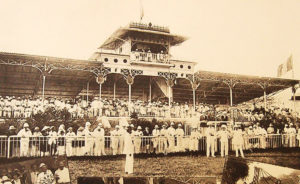
A horse race meeting in Saigon
There was also a day at the races, complete with a betting shop. A grey horse named Ly-Tong, winner of the Festival Commission prize, was presented by the jockey Binh. It was bought for 1,500 piastres by M. Doumer and offered to the Emperor. Festival events on Tuesday were also popular: a fair, public games and a torchlight procession.
The Emperor wanted to visit the tombs of his ancestors at Go-Cong, so he was taken there.
The journey passed without incident. All along the Go-Cong road to the tombs (about two kilometers), the natives had massed themselves, dressed in ceremonial garments and bearing the attributes of cult and emblems of war. There were also a number of small portable shrines, and many tricolour flags and banners. But not a single yellow flag (let us recall that it is the national flag of the Annamites, the ancient masters of Cochinchina). There was only a yellow curtain at the door of the tomb pagoda, which was also very richly decorated. The Emperor, after having made his devotions before the funerary altar of his ancestors, wrote several inscriptions.
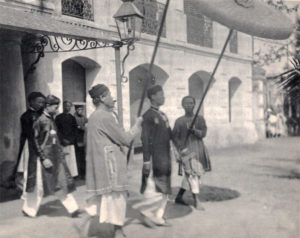
Emperor Thành Thái with his brothers in 1900 (source unknown)
The return journey was undertaken without popular ovations. Six gendarmes, the interim Lieutenant Governor, and M. Briere, the Résident Supérieur of Annam, accompanied the young sovereign, who was doubtless unaccustomed to travelling without being greeted by a soul. But he seems to have taken this very philosophically.
On the subject of reports on the Emperor, here are some amusing details.
As soon as they heard that their sovereign was coming to Saigon, the natives were surprised, and they then stamped with impatience, curiosity, and joy.
The Emperor came, and with him disappointment, in spite of the appearance of the reception, the bells, the bulwarks, and the cannon shots.
They all knew the secular customs: the people must prostrate themselves before the sovereign, never raise their eyes to his august person. They also knew that this sovereign, according to rites, should only leave his palace once a year for a pious festival. They knew that he must always maintain a divine attitude, barely turn his head, be transported only in a sedan chair. And yet here he was, this young emperor who loves to break with traditions, travelling by car, by train, to the theatre to see Saigon’s “Loïe Fuller,” to revues, parades….. And how he delights in them! He does the round of dinners, social evenings, soirées, buffets. He smokes like a Swiss, tours the salons, and even attempts to sing madrigals.
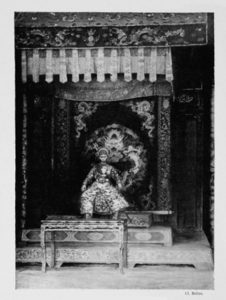
Emperor Thành Thái on the throne in the Thái Hòa Palace, from Empire colonial de la France. L’Indo-Chine: Cochinchine, Cambodge, Laos, Annam, Tonkin by Jules Gervais-Courtellemont (1901)
This was truly the end of the world for old Annamites.
Then there was a large review of troops. Three thousand men marched before the two sovereigns.
There were also regattas, a municipal ball, a “battle of the flowers” parade and a bicycle race which inaugurated the first Indochinese vélodrome. And then, yet more balls, more dinners, at the Cercle militaire, the Lieutenant-Governor’s Palace, the Town Hall, aboard the imperial ship, and so on. Until 15 December, the date of the departure of the Emperor, when M. Doumer would accompany him back to Hue.
The impressions of the young sovereign himself? It is said that he found the parties too short. He wanted to stay in Saigon. He found much more to amuse him there than in the palace of Hue, in those dull temples where his boredom is as divine as his person.
These festivals will have a considerable influence on our policy in the Far East.
This friendly view of the sovereigns of two races, of two peoples who were always enemies, indicates well to the Oriental people (for whom mere phrases, speeches, proclamations, edicts, promises signify nothing) that all the inhabitants of the Indo-Chinese peninsula are now definitively united under our high and firm protection. Above their respective countries, there will henceforward be another country greater and more powerful: France.
Jean Hess
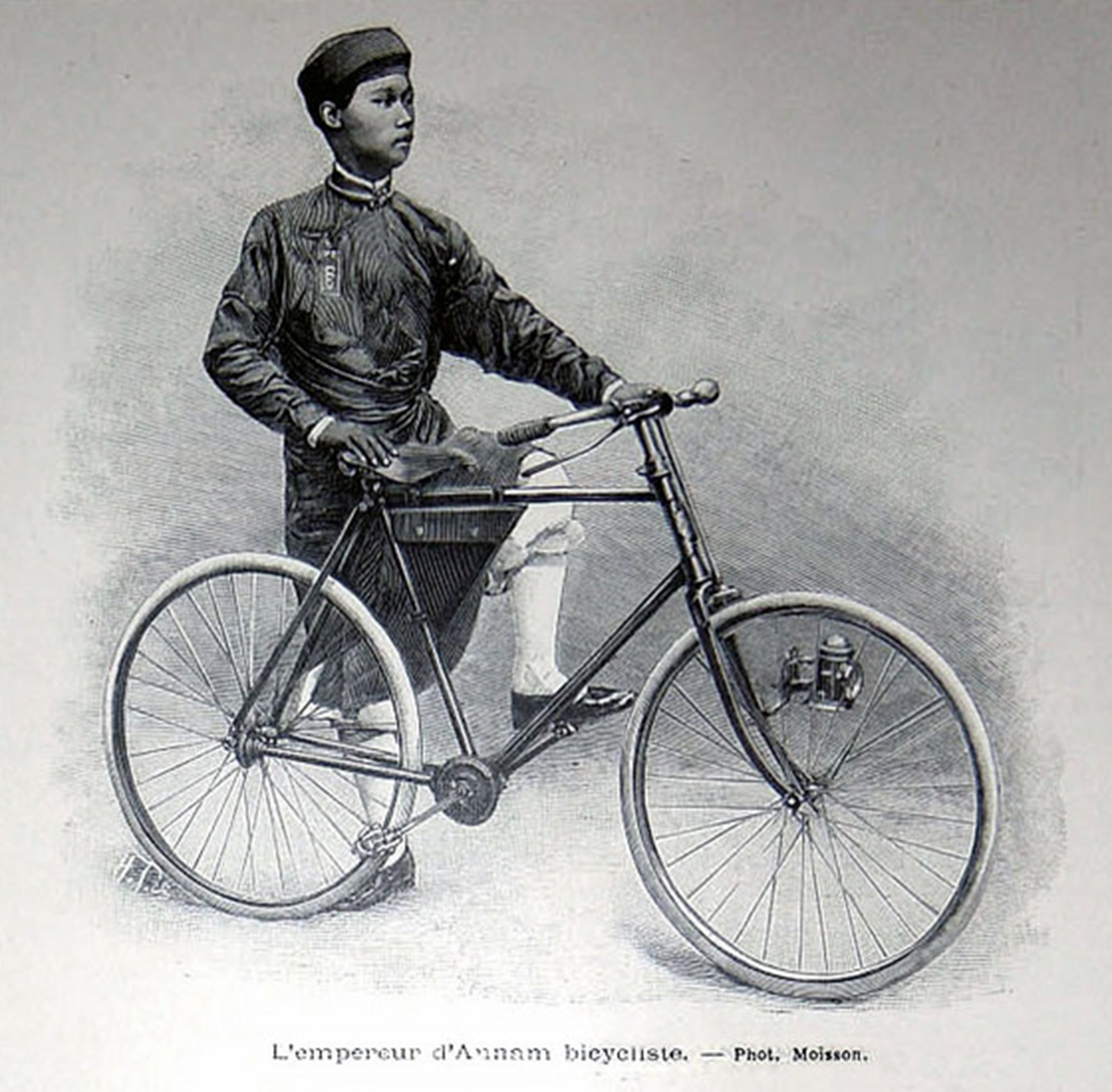
“The cyclist emperor of Annam,” from L’Empereur d’Annam en Cochinchine, L’Illustration, 22 January 1898
Tim Doling is the author of the guidebook Exploring Huế (Nhà Xuất Bản Thế Giới, Hà Nội, 2018).
A full index of all Tim’s blog articles since November 2013 is now available here.
Join the Facebook group page Huế Then & Now to see historic photographs juxtaposed with new ones taken in the same locations, and Đài Quan sát Di sản Sài Gòn – Saigon Heritage Observatory for up-to-date information on conservation issues in Saigon and Chợ Lớn.

